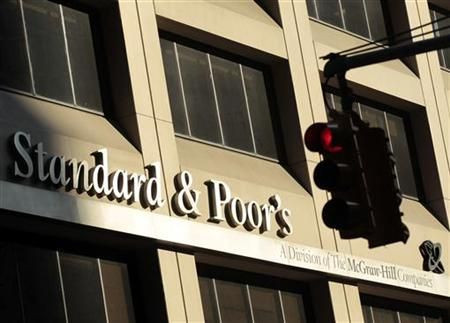S&P Downgrades: France, Austria Moved From AAA Rating; Germany Emerges With Solid Outlook

Standard & Poor's downgraded the credit ratings of nine Eurozone governments on Friday, an unprecedented relegation that included France and Austria but spared Germany.
S&P also demoted Italy, Spain, Portugal, Cyprus, Malta, Slovakia and Slovenia.
France and Austria had been rated at triple-A status, the top rating the agency gives out to countries. France and Austria were downgraded one notch, and that now means their bonds will be rated at AA-plus.
Italy, Spain, Portugal and Cyprus, however, weren't as lucky. They were all lowered by two grades. Italy, specifically, is hit hard by the demotion. Its bonds are now rated at S&P's lowest investment grade, BBB-plus. Portugal's bonds move into junk status.
"In our view, the policy initiatives taken by European policymakers in recent weeks may be insufficient to fully address ongoing systemic stresses in the Eurozone," S&P said in a release announcing the downgrades.
The agency, though, affirmed the ratings of seven countries, including AAA-rated Germany, Finland, Luxembourg and the Netherlands. But it also gave a negative outlook to Finland, the Netherlands and Luxembourg. Germany was the only country mentioned for which the agency gave a stable outlook.
In its release, S&P said that it downgraded the countries because of weak economic conditions in the Eurozone and a lack of resolve on how to solve the crisis by European policymakers. Other reasons for the downgrade included tightening credit conditions, an increase in risk premiums for a widening group of Eurozone issuers, weakening economic growth prospects and "an open and prolonged dispute among European policymakers over the proper approach to address challenges."
French finance minister Francois Baroin immediately tried to downplay the downgrade. The last time France was at AA-plus status was in 1975.
"This is not a catastrophe. It's an excellent rating. But it's not good news," Baroin told France 2 television, according to Reuters.
The euro has fallen to $1.267 dollars on the news and is likely to fall further in the coming days and weeks.
It's unclear at this point how the news will affect the markets. S&P's move had been expected when, in early December, the agency announced it would review 15 members of the Eurozone for potential downgrade.
Standard & Poor's pointed to the EU summit on Dec. 9 and other statements from policymakers in the month since as examples of its decision to downgrade. Those examples, the agency said, lead it to believe that the agreement reached has not produced a breakthrough of sufficient size and scope to fully address the Eurozone's financial problems.
"In our opinion, the political agreement does not supply sufficient additional resources or operational flexibility to bolster European rescue operations, or extend enough support for those Eurozone sovereigns subjected to heightened market pressures."
The downgrades could complicate deals for European governments to sell bonds to private-sector investors and raise money. This could raise the risk of default in some European nations.
© Copyright IBTimes 2024. All rights reserved.





















